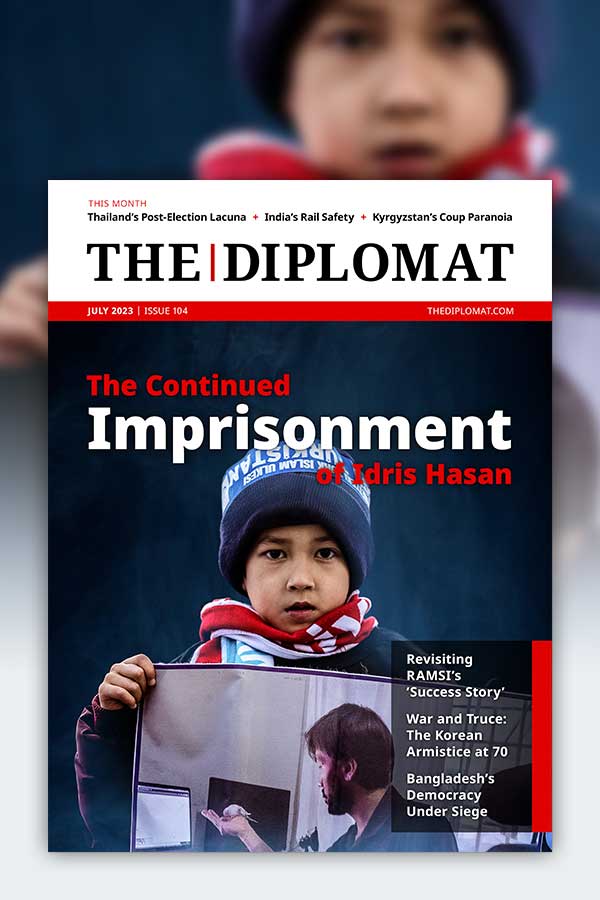|
Welcome to the latest issue of Diplomat Brief. This week our top
story explores India’s Zojila Tunnel, a route with both local and strategic value. We also have
an interview with Gregg A. Brazinsky, a professor of History and International Affairs at George
Washington University’s Elliott School for International Affairs about the Korean Armistice
Agreement, 70 years on.
|
|
Story of the week
|
![[object Object]](https://thediplomat.com/diplomat-brief/2023/vol30/images/feature.jpg?v=2) |
Security The Zojila Tunnel: A Strategic
Lifeline to Ladakh
What Happened: The Zojila Pass, situated between Srinagar and Leh, has
long been a crucial route through a mountainous area prone to heavy snow and
avalanches in winter. In 2018, India inaugurated a herculean tunnel project to
provide year-round access for the army and residents of the region, ensuring
safer and more secure transport. The project is estimated to cost around 68.09
billion Indian rupees.
Our Focus: Located near the tense China-India border, the Zojila Tunnel
is a deeply strategic project. The distance from Baltal to Meenamarg will come
down to 13 kilometers from the present 40 kilometers once it is finished; travel
time is expected to be cut by an hour and a half and the journey is expected to
be less strenuous. The terrain is characterized by steep slopes, rocky surfaces,
and unstable glaciers, making the construction process challenging. “We toiled
hard,” one worker told The Diplomat about overcoming construction and
environmental challenges.
What Comes Next: The Zojila Tunnel is expected to be completed by 2026.
On a local level, it will change lives. “The Zojila Tunnel will change our lives
for the better… This will bring economic opportunities and prosperity to our
remote villages,” one resident told The Diplomat. On a strategic level, the
tunnel will solve a logistical problem for India, allowing transport between
Srinagar and Leh even in winter when the present route, a national highway
through the pass, is impassable. Read this story |
|
Behind the News
|
INTERVIEW Gregg A. Brazinsky
Gregg A. Brazinsky, also director of the Sigur Center for Asian Studies and
co-director of the East Asia National Resource Center, on the lessons learned by
South Korea from the Korean war: “South Korea is now a flourishing democracy and
this has enabled it to have wide-ranging and serious reflection on the meaning
and consequences of the war. There is much disagreement in South Korea about how
the war should be viewed but there is perhaps consensus on the fact that it was
a horrific tragedy that must nor be repeated.” Read the interview |
|
This Week in Asia
|
Northeast Asia Japan’s Drone Budget is Growing
Tokyo’s spending on uncrewed
systems and capabilities appears to have risen considerably, if an overview
of the Fiscal Year 2023 budget request published by the Ministry of Defense is
anything to judge by. The overview describes a trio of projects aimed at
studying and developing various types of armed drones. In all, Japan will spend
182.7 billion yen ($1.37 billion) on drones in Fiscal Year 2023, which began in
April. Find out more |
South Asia ‘INDIA’ Versus the BJP
India’s new opposition alliance has given itself a smart name. But can its
constituent parties hold together and unseat the ruling BJP? The 26-party INDIA
alliance, which includes the country’s grand old party, the Indian National Congress,
aims to take on the BJP-led National Democratic Alliance (NDA) in general
elections that are due to take place in 2024. India’s multifarious opposition
has struggled since Narendra Modi rose to power in 2014 to coalesce into the
kind of national-level opposition that’s required to unseat the BJP at the
center. Find out more |
Southeast Asia Prime Minister Hun Sen Dominates
Cambodian ‘Election’
This week, Prime Minister Hun Sen’s party claimed a crushing victory in a
national election in which it faced virtually no opposition, paving the way for
the impending handover of
power to his son Hun Manet. According to preliminary results, the Cambodian
People’s Party (CPP) won 120 of the 125 seats
in the National Assembly, after the main opposition party, the Candlelight
Party, was barred from
participating. The 70-year-old leader said last week that he plans to hand power to
his son, after more than 38 years at the helm, in “three or four weeks,” but it
may come at a cost, with the U.S. government announcing a “pause” in
aid programs and impending visa restrictions against individuals who have
“undermined democracy” in the country. Find out more |
Central Asia What is the Cost of Uzbekistan’s
‘Pragmatic’ Taliban Policy?
Tashkent’s approach to the Taliban’s resurrection in Afghanistan has been called
‘pragmatic’ by many. It has shifted from strict non-engagement to a now steady stream of
diplomatic outreach efforts. While Uzbek officials say that Tashkent isn’t
going to recognize the Taliban government first, it’s increased pace of
engagement suggests Uzbekistan hopes to get back to “normal” business as soon as
possible with Afghanistan. Major transport projects, including a railway, hang in the
balance, as does Uzbekistan’s ambition to be a bridge between
Afghanistan and the world. Find out more |
|
Visualizing APAC
|

|
Taiwan’s current energy mix (regarding electricity consumption and primary energy
supply) remains dominated by oil, coal, and natural gas, while nuclear and
renewables (water included) contribute only marginally. It’s shifted only slightly
since 2016. See the full picture |
|
Word of the Week
|
Society Бүтүн Кыргызстан
Butun Kyrgyzstan, Kyrgyz for “United Kyrgyzstan,” is an opposition
political party led by Adakhan Madumarov. Find out more |
|
 |


![[object Object]](https://thediplomat.com/diplomat-brief/2023/vol30/images/feature.jpg?v=2)

